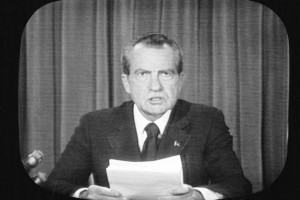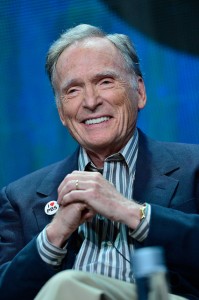
I was working as a busboy at a restaurant in Ontario Place at the foot of Toronto the summer Richard Nixon resigned from the White House. I was a high school student and it was a pretty good summer job; $2:10 an hour and all the chips you could eat. The restaurant faced East so I watched the CN Tower getting topped off around the same time Dick Nixon got cut down.
So it was at the restaurant where I heard–over a radio–Nixon say that he would resign effective the next day. Nixon’s dramatic announcement the night of Aug. 8, 1974–exactly 40 years ago–was not unexpected. The disgraced president was facing impeachment. There was so much damning evidence against him even Susan Fennell would have had her limo driver pull over and observe a moment’s silence.
If you believe reality shows are all about watching people be humiliated on television, Nixon’s resignation was the ultimate reality show. In a year-and-a-half, the crazy bastard turned the biggest landslide in American political history into a “You’re fired!” moment. Caught red-handed and cornered, alone at the end, he quit before he got voted off the island. It was fascinating to witness history unfold, live, on television. Even in Canada, Watergate had dominated the news for 18 months and the daily hearings became an obsession for many television viewers. We became fascinated by the likes of Sam Erwin, Sen. Howard Baker, G. Gordon Liddy and John Dean. The key players all became big TV stars. Dean’s wife got so much attention for her tight hair bun it would have hosted it’s own reality show on E! had Watergate happened today.

You can get a sense of it all Friday night at 10 p.m. as PBS presents “Dick Cavett’s Watergate.” The special was thrown together fairly quickly and it could have used more context. If you’re too young to remember Watergate but old enough to have watched the O.J. Simpson trial there are parallels as far as how both events took over daytime television. Comparisons pretty much stop there, however. The O.J. trial, and it’s shocker ending exposed a deep racial divide in America. Watergate was all about lies, corruption and cover up at a time when most North Americans still assumed that their leaders were honest and moral. Coming hard on the heels of the war in Vietnam, Watergate and Nixon’s disgrace so shattered the psyche of America that disco was the only way people could cope.
Cavett, who hosted an ABC late night talk show at the time, was kind of Johnny Carson with a Master’s Degree. Whereas Carson would joke about Watergate and almost do everything to distract his audience from the troubles of the day, Cavett would build whole episodes around making viewers squirm. The special shows how he lucked into booking Ted Kennedy–then trying to get past his own tarnished reputation–two days after reports of the break in at Democratic headquarters in the Watergate hotel. Kennedy’s remarks are cautious but pretty much on the nose about the ramifications of what was seen at the time as a petty crime carried out by third-rate burglers–“plumbers” as Liddy’s gang was called.

Cavett managed to book many key players in the Watergate affair, including Washington Post correspondents Bob Woodward and Carl Bernstein. It’s hard, again, to put everything in context, but these two probably inspired many of us who came after to become reporters, even if all we ever exposed was how Jay Leno and NBC screwed over Conan O’Brien. Woodward and Bernstein were old school in that they worked the phones, cultivated sources, confirmed everything three ways and then got the story up first. They worked for editors and a news organization that had the balls to take their obligation to be adversarial seriously. Woodward and Bernstein put the thrill back into cracking a big story and, in those golden years before three media companies controlled everything, holding feet to the fire was what it was all about.
advertisement
Younger viewers watching Woodward and Bernstein on the Cavett special may just shrug and laugh at their clothes. Everybody dressed like they were in “American Hustle” in the mid-’70s. Trust me, Woodward and Bernstein were pretty bad-ass back then. Redford and Hoffman played them in a movie. They even named their main source after a porn flick.
Cavett did one special show right from the Watergate hearings room. It’s good to be reminded he wasn’t just trying to play straight man to Groucho Marx or Orson Welles every week, as entertaining as that often was. It’s also good to see somebody valued the shows enough to save them. NBC placed less value on Carson’s early “Tonight Show” legacy, with much the first eight or nine years erased on hauled off to land fill sites. Seems Nixon’s tapes weren’t the only ones with missing sections.






